- Home
- Tim Sullivan
The Cyclist Page 7
The Cyclist Read online
Page 7
'You can't do both?' he asked hopefully.
'We're working five other cases but I'll see what we can do.'
In the car, on their way to the chemist with the warrant, Ottey thought it was maybe a good time to bring up Cross' situation with his dad. This was not only because they were, as always, enjoying a long silence, but because he couldn't get away. They were in a moving car. He was trapped – had nowhere to go.
'Have you ever missed a Thursday?' she asked.
'I don't understand,' he replied.
'With your dad?'
'A few times. When it was completely unavoidable, obviously,' he said.
'Because of work?' she asked.
'Yes.'
'And how was your dad about it?'
'He knew it had to be important for me to miss it. He understood.'
'Okay.' They drove on in silence for a while. 'So your dad's work at the Museum...'
'It's not work,' he quickly corrected her. 'It's a voluntary position.'
'You could still call it work, surely. Not being paid doesn't mean it’s not "work".' He didn't reply. She went on. 'How important is this new job to your dad, do you think? Voluntary or not?'
'I have no idea.'
'Couldn't it be as important as yours to his way of thinking?'
'Of course not. We deal in murder.'
'That old chestnut. You can't denigrate everyone else's work just because they're not dealing with murder.'
'I don't. There are doctors, firemen, scientists, all of whose work I would call important,' he reasoned.
'And Bach?' she asked. 'Was his work important?'
'Well, obviously.'
'Not to someone who doesn't like classical music,' she countered. He didn't answer, which she found encouraging, so she continued, 'It's completely subjective, is my point. What is and what isn't important to people. So I'd argue your dad's new work, or whatever you want to call it, is important to him and will doubtless make a difference, however small, to all of those people who listen to him,' she said.
'That's not the point,' he replied.
'Then what is the point?'
'We have an arrangement. We always have dinner on a Thursday. They'll just have to find another time.'
'Why can't you find another time?' she asked.
'You don't understand,' he objected.
'So you keep saying,' she said.
Patel wasn't annoyed at the loss of business so much as the fact that several elderly and vulnerable people needed to pick up prescriptions and now wouldn't be able to. He made arrangements for one of his juniors to deliver them. Cross was interested in this. He thought this man's priorities were in the right order. They left forensics to it and went back to the unit. It was around two o'clock when the call came in. Forensics needed Cross and Ottey back on scene immediately. They had found blood. It had been cleaned up, but there was a trail leading to the door and outside to the edge of the pavement. Also a major pooling by the counter inside. They had found a couple of actual traces near the base of the counter that had been missed and one on the door frame. Samples had been taken.
When they arrived back, Patel hadn't been informed of anything. The expression on the detectives' faces, however, told him all he needed to know. That things had just got serious. They took him down to the station.
'Am I under arrest?' he asked, when they walked into the Voluntary Assistance suite. Cross often wondered about this question, which was asked with irritating regularity. To him he thought it had to be clear whether they were or not because an arrest was always preceded by the words "Mr so-and-so, I am arresting you on suspicion etc..." and they were read their rights. Did they ask because they had an underlying fear of something illegal being discovered that wasn't necessarily anything to do with what they were being questioned about? Or was it a kind of inverted reminder to the detectives that they could leave whenever they wanted to? They never pushed this ability to leave, however, through fear of then being arrested and detained in a cell.
'You are not,' said Ottey.
'I told you I had nothing to do with his drug-taking,' Patel replied.
'You can see why that is a little difficult for us to accept at face value. You're in the same cycling club. You're a chemist. Bit of a coincidence, don’t you think?' she went on. ‘What I think is that he persuaded you. What harm would there be if no-one found out?'
'I am a respectable pharmacist and an amateur cyclist. End of. What would be the benefit to me of supplying him with gear?' he said.
'"Gear?"' Cross asked.
'Oh, come on. I can say "performance-enhancing drugs" if you want, but we all know that's what it's called.'
'Maybe you didn't actually supply him but just pointed him in the right direction,' Ottey said.
'Why would I do that?' asked Patel.
'Like we said. To win the L'Étape,' she said.
'I've already told you I have no interest in the L'Étape,' he protested.
'That's not entirely true though, is it?'
'I told you it's nothing to do with me.'
'Except that you're now in the team of eight. You were the reserve and have been bumped up. Why didn't you tell us about that?' she asked.
'Why d'you think? I knew you'd point the finger at me. Like you are actually doing now. Which is stupid. Let me make this very clear for you. Yes, I withheld the fact that I'm now on the team. Am I pleased about it? Yes, excited and also a little nervous. You see, I'm not the best cyclist in the club so I'm worried I'm not up to it. Did I kill Alex to get on the team? It even sounds stupid saying it out loud. No, I did not. Did I supply him with drugs? Which I have to admit does sound a little more plausible. No, I did not. Did I steer him in the right direction to get hold of them? No. Did he ask? Yes. Did I notice over the last six months that his behaviour had changed? Yes.'
'How did you find out that he was using drugs?'
'If you know what to look for it's fairly obvious. Anyway, I had the advantage of the fact that he'd already approached me. I kept an eye on him from then on.'
'So how did the group find out about Alex?'
'I told Matthew he'd approached me. Then with his stats and behaviour in the last few months I suspected he'd found another source.'
'Why did you tell him?' Ottey asked.
'Why do you think?' he asked, a little incredulously.
'Because drug-testing is a big thing on the L'Étape now,' said Cross. It was the first time he'd joined the conversation. 'They've trained for months, getting up early in the morning, cycling after work, sessions in the gym, in all weathers, making all sorts of sacrifices. Then, say they win. It's been all worthwhile until Alex fails his drugs test. They're disqualified. All of them. Then the entire team are branded as cheats.'
'And there you have it,' said Patel.
'Did you always want to be a chemist?' asked Cross, changing the line of questioning abruptly.
'What? Um, no, no, I'm one of those failed doctors, I'm afraid.'
'You studied medicine?'
'No, I messed up my A levels. Didn't get the grades.'
'That must've been disappointing,' said Cross.
'Not really. I think it was more my parents' dream than mine. They came over from Uganda during the Amin years. Very humble, hard-working and horribly ambitious for their child. Their only child. They worked hard because they were desperate for me to have a better start in life than them. A familiar immigrant story, I’m sure you’re thinking, and of course it was. They wanted me to be a doctor. I think, maybe subconsciously, I fucked up my A levels deliberately. I'm very happy with the way things worked out, though. Mind you, since pharmacists have been allowed to give minor medical advice and flu jabs, people seem to confuse us with doctors – so I kind of ended up halfway there.'
'How so?' asked Cross.
'They treat us like the first port of call before they go to A&E. Or they go there, see the waiting time and come to us anyway. We often have a queue of people "waiting for
treatment". So much so that we have a doctor's consulting room once a week.'
'Private?'
'No. I cover the cost myself,' said Patel.
'That's very generous of you,' said Ottey.
'It actually works out both ways. It solves the hassle of turning people away. Though it has caused a bit of an issue with people trying to treat it like their normal GP. It really is for emergencies or the "well-worrieds", as I call them, who can't get a GP appointment quickly enough. They're not treated, just examined and their minds put at rest. Unless there is a problem, in which case we either call their practice or send them to A&E.'
It was the word "emergencies" that got Cross thinking. He then got up and left the room. Ottey closed her eyes slowly.
'Am I free to go?'
'I'm afraid not.' She needed to wait for the results of forensics and the blood. Was it a match for Alex? 'Would you like something to drink?'
'A coffee would be great. Thanks.'
Ottey got Mackenzie to make the coffee, and Mackenzie was grateful, in truth. It gave her a chance to get away from looking into the ownership of the garages, which wasn't getting her very far. She'd decided to go down there later on that day and ask around. She felt sure she might get further that way.
Ottey marched into Cross' office without knocking. Not because she knew that would annoy him, which it did – he practically jumped out of his seat – but because she was annoyed. 'Why did you leave the interview like that?'
'It wasn't actually an interview.'
'Don't be pedantic. You know exactly what I mean,' she said.
'He didn't do it. Any of it. He's not stupid.'
'Like Alice said, it could've been an accident.'
'It could. But the likelihood is, I would suggest, tiny. I thought my time was better used elsewhere.'
'And what about mine?' she said.
'I couldn't possibly speak for yours,' he replied.
'And the blood?'
'He's a chemist. He said people treat chemists like A&E departments these days. They're encouraged to go into chemists for advice and flu jabs and it seems to have escalated to a minor trauma unit. It'll be something to do with that. Have you asked him?'
'Obviously not. I'm waiting for the results.'
'It might save you, and him, a lot of time if you just asked. He seems to be a very community-minded individual to my mind.'
Patel laughed when Ottey mentioned the cleaned-up blood.
'Perhaps you didn't hear what I said before? On some days, not that often, it's true, we're like an outpost of A&E. Just without all the facilities.' He then got out his phone and scrolled through. He showed her an article from the Bristol Evening Post from a few months ago. "Chemist delivers baby". It showed a picture of him in the pharmacy with a woman, sitting on a chair by the counter, holding a baby. She'd just given birth. 'That was a first!' said Patel proudly. 'They called the girl Angelica Justine.' Ottey looked at him blankly. 'Her initials are AJ, like my name Ajjay. It was a girl, so that was the closest they could get. They ended up calling her AJ for short. Isn't that sweet?'
'Sure. And the blood leading out of the pharmacy to the pavement?'
'It's actually coming into the pharmacy from a car. A stabbing. Young kid. They just dumped him. Stabbed in the leg. Some sort of gang punishment. But they'd nicked his femoral. We managed to stem the blood till the ambulance arrived. He could've died. Idiots.'
'He helped a woman give birth in the pharmacy and tended to a stabbing victim. But you already knew that,' Ottey said to Cross.
'I didn't actually know it but I'd come to the conclusion that in all probability it was something like that. Then Alice looked it up for me for confirmation,' he replied.
'And you didn't feel the need to share that?'
'No. I didn't want to interfere with your line of questioning.'
'You didn't tell me about any of the information you got at the water tower either. With the cyclists.'
'You didn't ask,' he said.
'I shouldn't have to ask. I'm your partner. You should share it.'
'I see.'
She could tell this didn't sit well with him. Deciding when to share anything was a difficult judgement for him to make. She had picked up on this. She was coming to understand that his awkwardness and reluctance to do certain things, things that were normal and everyday things for others, was not his being difficult. It was just the way he was made. He found it complicated.
'Maybe it would be easier if I asked you if you had things to share?' she volunteered.
'Yes. That's a good idea,' he said and started to pack his small backpack and put on his dayglo yellow cycling jacket.
Chapter 12
That night, Cross went to church. Not because he was in any way religious. He was quite the opposite. These days he would describe himself as an atheist. For a while it had been agnostic, but then at thirteen he came to the absolute conclusion that there was no God and although he saw, both historically and around him, that it gave others comfort in life, he would just have to live with his lack of faith. In some respects he knew believing would've suited his personality; the regularity of a Sunday service, nightly prayer while kneeling beside his bed, even weekly bible-study meetings. Catholicism also, he concluded, would have been his faith of choice. Judaism ran it a close second. But with Catholicism it felt to him that there were very clear rules by which one had to abide. He liked the rigidity of its beliefs. He once thought that most religions would benefit from such clear guidance for their followers. But then fundamentalism sprang up in all its forms and all religions. So he had to redefine his opinion.
The reason for his visit that night was that he played the organ at this church. Not for services or anything. Just for himself. He thought playing during a service, a wedding or a funeral would be an act of hypocrisy, as he would be participating in an act of worship. He couldn't reconcile this with his lack of faith, and it had become a subject of much discussion with the young priest, Stephen, who was engaged in an active campaign to get George to agree to give a recital or two and raise money for the church. But George was reluctant. Stephen had even gone so far as to organise a committee to put a recital together. He was met with obdurate resistance from Cross.
'Perhaps you could calculate how much a recital might earn, and I could just make an equivalent contribution to the church?' Cross had suggested.
'That’s not the point. I think you should share your gift with others,' Stephen replied.
He had once pushed this particular thesis too far and their discussion had faltered almost terminally. Stephen made the mistake of referring to it as a "gift from God". George's immediate response was that it wasn't a gift from anyone, particularly not from an imaginary God. It was actually the result of hours upon hours of study and practice. Many priests might have taken offence at the "imaginary" tag, but not Stephen, who was obviously made of sterner stuff.
The deal they had brokered was that George could practise in return for doing regular maintenance on the organ. Because of course, George being George, it wasn't enough for him just to learn how to play. He needed to know how the organ itself worked. He was now something of an expert in not just playing, and the world history of organ playing, but also the fundamental mechanics of the instrument itself. So every Wednesday night George would let himself into the church and play. He often found it useful, not just as a break from the particular case he might be working on, but actually in formulating fresh ideas about it. He was in such a different state of mind when he was playing. Not only did it relax him, but the sound of the organ, the co-ordination between the different manuals and his feet hovering over the pedals, instinctively playing the right ones, set his mind free. He found himself thinking about work in a different way, such was the mental release he found in playing. It was surprising how many times he'd solved a puzzle in a case, a conundrum that had befuddled them for weeks, while in church, playing the organ. Stephen doubtless thought there was some form of
divine intervention going on. But he certainly wasn't going to say that to his musical detective.
But no fresh perspective for George this night. However, he felt that he'd cleared his head a little. The next logical step for the investigation was the gym. He finished playing and switched the organ off. But when he left, he was approached by a few women who had come into the church after he'd started practice. They immediately told him how wonderful his playing was. He was quite pleased by this: a little approval often went a long way with him, until he recognised one of them as being from the "recital committee" Stephen had introduced him to a few weeks before. That's how they knew when he practised. Stephen had told them. He was a cheeky, pushy bugger. But what was odd was that George found himself actually enjoying their comments and praise. It pleased him. Encouraged him. So rather than make his excuses and cycle home, he stood there for a good ten minutes basking quietly in their compliments. Until that is, one of them judged it the right time to say what a shame it was no-one else had the opportunity to hear him. Who knew that they had such talent in the congregation? This sentiment had a familiar ring to it. It could have come straight out of Stephen's mouth. Cross was quick to point out that he wasn't a member of their congregation. Nor was he a believer, which brought them neatly to the idea of a recital. It was at this point that he abruptly extricated himself from both the church and the conversation. He thought he'd done it with great tact and diplomacy. But they were left wondering why Stephen hadn't told them that the man he wanted them to encourage to play was so rude.
As Cross got on his bike, he looked up at the rectory and saw the priest at a window. Stephen waved and smiled. George just ignored him and cycled off, which left the priest with the distinct impression that his plan was working. It wouldn't be long now.
Chapter 13
The next morning Cross and Ottey headed off to Alex's gym. As soon as they got into the car, Cross began talking to Ottey. This was really unusual for him. She had more than a sneaking suspicion that he was trying to head her off from reigniting the discussion about his Thursday-night dinners with his father.

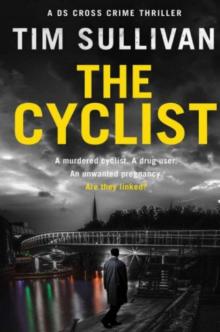 The Cyclist
The Cyclist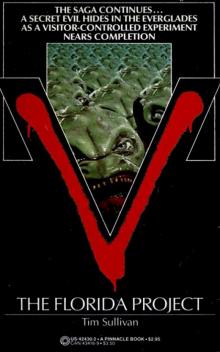 V: The Florida Project
V: The Florida Project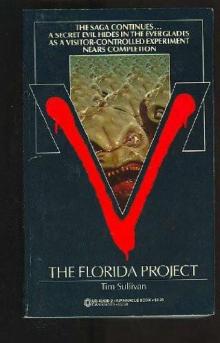 V05 - The Florida Project
V05 - The Florida Project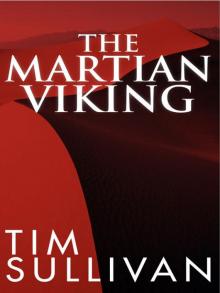 The Martian Viking
The Martian Viking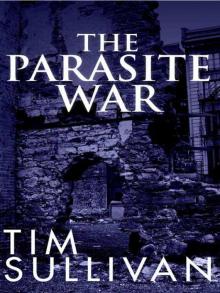 The Parasite War
The Parasite War